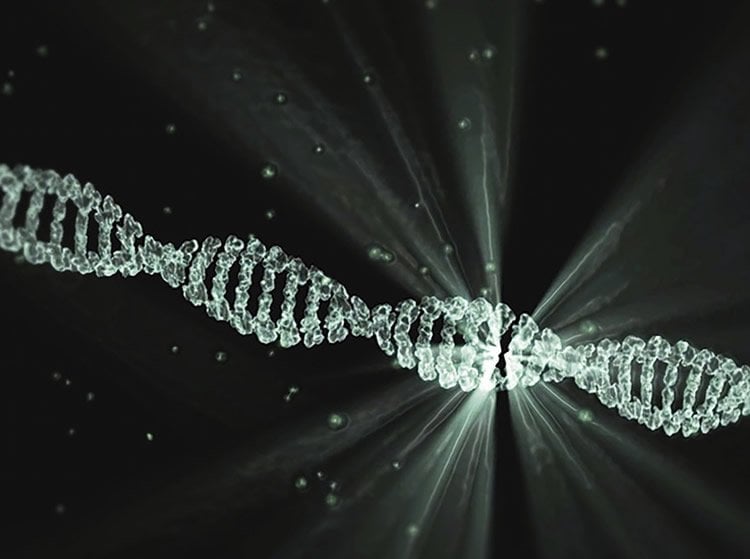Summary: Umea University researchers report stress related changes in the CRH gene is linked to an increased risk of suicidal ideations in adults and psychiatric illness in teens.
Source: Umea University.
Researchers have linked genetic changes in the so-called CRH gene, which affects the regulation of the body’s stress system, to suicide risk and psychiatric illness. The study of epigenetic changes in the body’s hormone-based stress system has shown that stress-related changes in the CRH gene are linked to both serious suicide attempts in adults and psychiatric illness in adolescents.
The research study, which is a collaboration between researchers at Umea University, Karolinska Institutet and Uppsala University in Sweden, has been published in the journal EBioMedicine.
Previous studies have indicated an overactive stress system in individuals with increased suicide risk. In the current study, researchers report that epigenetic changes in the CRH gene, which are linked to serious suicide attempts in adults, could also be found in adolescents with high risk of psychiatric illness.
Recently published research output shows that serious suicide attempts lead to a heavily reduced lifespan with an increased suicide risk and risk of mortality from natural causes particularly in adolescents. In the last ten years, it has become twice as common for Swedish adolescents between the ages of 10 and 17 to suffer from psychiatric illness. An alarming increase also in young adults can be seen. This according to a recently published report from the Swedish National Board of Health and Welfare.
In the study, researchers examined 88 individuals who had attempted suicide. The participants were divided into high and low risk groups based upon the severity of their suicidal behaviour. Through blood samples of the participants, epigenetic markers in the form of DNA methylation in the stress system-related genes were analysed. In the next step, the discovered epigenetic changes in the CRH gene were studied in blood samples from two other cohort studies including 129 and 93 adolescents respectively in the age span of 14 to 17. The adolescents were divided into high and low risk groups based upon assessments of their psychiatric symptoms. The results show that epigenetic changes in the CRH gene were more prevalent in the group of adolescents with an increased risk of psychiatric illness.
“Since psychiatric illness is a serious and growing public health problem, it’s important that we take early signs of psychiatric illness and suicidal behaviour into consideration in suicide prevention,” says Jussi Jokinen, professor in psychiatry at Umeå University who led the current study.

“Our environment affects our genetic expression, which is usually referred to as epigenetic change. Even if we aren’t able to draw distinct parallels between the findings in these cohort studies, our results still point towards the importance of an optimal regulation of the stress system for psychiatric illness.”
Source: Anna Lawrence – Umea University
Publisher: Organized by NeuroscienceNews.com.
Image Source: NeuroscienceNews.com image is in the public domain.
Original Research: Full open access research for “Epigenetic Changes in the CRH Gene are Related to Severity of Suicide Attempt and a General Psychiatric Risk Score in Adolescents” by Jussi Jokinen, Adrian E. Boström, Ali Dadfar, Diana M. Ciuculete, Andreas Chatzittofis, Marie Åsberg, and Helgi B. Schiöth in EBioMedicine. Published online December 18 2017 doi:10.1016/j.ebiom.2017.12.018
[cbtabs][cbtab title=”MLA”]Umea University “Genetic Changes Caused by Environmental Factors Linked to Suicide Risk.” NeuroscienceNews. NeuroscienceNews, 2 January 2018.
<https://neurosciencenews.com/genetics-environment-suicide-8247/>.[/cbtab][cbtab title=”APA”]Umea University (2018, January 2). Genetic Changes Caused by Environmental Factors Linked to Suicide Risk. NeuroscienceNews. Retrieved January 2, 2018 from https://neurosciencenews.com/genetics-environment-suicide-8247/[/cbtab][cbtab title=”Chicago”]Umea University “Genetic Changes Caused by Environmental Factors Linked to Suicide Risk.” https://neurosciencenews.com/genetics-environment-suicide-8247/ (accessed January 2, 2018).[/cbtab][/cbtabs]
Abstract
Epigenetic Changes in the CRH Gene are Related to Severity of Suicide Attempt and a General Psychiatric Risk Score in Adolescents
The aim of this study, comprising 88 suicide attempters, was to identify hypothalamic-pituitary-adrenal (HPA) -axis coupled CpG-sites showing methylation shifts linked to severity of the suicide attempt. Candidate methylation loci were further investigated as risk loci for a general psychiatric risk score in two cohorts of adolescents (cohort 1 and 2). The genome-wide methylation pattern was measured in whole blood using the Illumina Infinium Methylation EPIC BeadChip. Subjects were stratified into high-risk and low-risk groups based on the severity of the suicidal behavior. We included CpG sites located within 2000 basepairs away from transcriptional start site of the following HPA-axis coupled genes: corticotropin releasing hormone (CRH), corticotropin releasing hormone binding protein (CRHBP), corticotropin releasing hormone receptor 1 (CRHR1), corticotropin releasing hormone receptor 2 (CRHR2), FK506-binding protein 51 (FKBP5) and the glucocorticoid receptor (NR3C1). The methylation state of two corticotropin releasing hormone (CRH)-associated CpG sites were significantly hypomethylated in the high-risk group of suicide attempters (n = 31) (cg19035496 and cg23409074) (p < 0.001). Adolescent cohort 1 and 2 consisted of 129 and 93 subjects, respectively, and were stratified by the in silico generated DAWBA measurements of a general psychiatric risk score into high-risk group (>~50% risk) or controls. In adolescent cohort 2, cg19035496 was hypermethylated in subjects with a high general psychiatric risk score. Our results show epigenetic changes in the CRH gene related to severity of suicide attempt in adults and a general psychiatric risk score in adolescents.
“Epigenetic Changes in the CRH Gene are Related to Severity of Suicide Attempt and a General Psychiatric Risk Score in Adolescents” by Jussi Jokinen, Adrian E. Boström, Ali Dadfar, Diana M. Ciuculete, Andreas Chatzittofis, Marie Åsberg, and Helgi B. Schiöth in EBioMedicine. Published online December 18 2017 doi:10.1016/j.ebiom.2017.12.018






